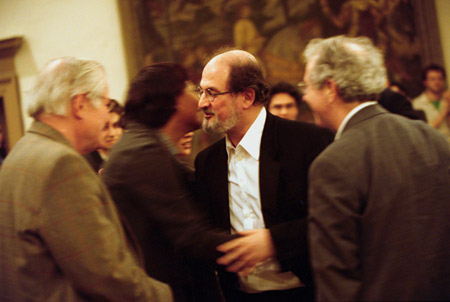Literary luminaries cut through Fogg
Kincaid, Rushdie, Ashbery read to enthralled gathering

Three of the 21st century’s foremost writers of English gathered at Harvard March 8 to read from their works. Sponsored by the Harvard Advocate, America’s oldest college literary magazine, the event featured poet John Ashbery ’49, and prose writers Jamaica Kincaid and Salman Rushdie.
Ashbery led things off. Recipient of the Pulitzer Prize and the National Book Award, among many other honors, the poet was introduced by Advocate President Cody Carvel ’03. Carvel quoted poet Kenneth Koch ’48, who said that reading Ashbery’s poetry was “like falling in love with some thrilling young person from Mars.”
Ashbery’s selections spanned his entire poetic career, from the poem “Some Trees,” which he wrote as an undergraduate, to an even earlier poem “The Painter,” inspired by a sestina by Elizabeth Bishop, to a long early poem called “He,” in which every line begins with the word “he.” The poem, the idea for which came to Ashbery in a dream, contains the line: “He is dangerous even though asleep and unarmed.”
Ashbery then read “Soonest Mended,” a poem he wrote in the ’60s that he described as a “one-size-fits-all confessional poem.” He ended with several recent poems soon to appear in a collection called “Chinese Whiskers.” One was a prose poem titled “A Nice Presentation.” Ashbery prefaced it with self-deprecating humor: “There seems to be a vogue for prose poems lately. I always seem to follow fashion.” The last poem was “Disagreeable Glimpses” (the title is from a musical composition by Eric Satie).
Writer and editor James Atlas, president of the Advocate’s board of trustees and author of a recent biography of Saul Bellow, introduced the next two readers, Kincaid and Rushdie. Musing about the source of their talent, he speculated that their outsider status gives them a uniquely insightful point of view.
“Both of them come from other cultures and have enriched our language with their perspectives,” he said.
Kincaid, who grew up on the Caribbean island of Antigua, a former British colony, read from her soon-to-be-published novel, “Mr. Potter,” the story of an illiterate chauffeur living on an island in the West Indies.
The gently rhythmic, repetitive prose seemed reminiscent of Gertrude Stein’s 1909 work, “Three Lives,” and like Stein, Kincaid uses an almost soporific style to capture the dulled sensibility of her lowly protagonist. The passage, which describes the last days of Mr. Potter’s life, was full of sentences whose balanced phrases and paradoxical meanings seemed to impart a funereal sluggishness to the narrative: “Everything was the same, and yet everything repudiated sameness.” “… [O]ne way or the other, the other or one way.”
Rushdie grew up in Bombay, was educated at Cambridge University, and now lives in London. He alluded to his alma mater as he settled himself behind the lectern. “I’m from the other Cambridge,” he said, “but this one’s nice too.”
Rushdie read a short story titled “At the Auction of the Ruby Slippers.” Set in the not-too-distant future, the story describes the auction of an item of memorabilia so revered that it has taken on magical, even sacred properties in the minds of its devotees – the ruby slippers worn by Dorothy in “The Wizard of Oz.”
“Behind bulletproof glass, the ruby slippers sparkle,” says the story’s narrator. “We do not know the limits of their powers.”
Piling detail upon detail as he depicts the crowded and expectant scene in the auction room, Rushdie portrays an enervated and despondent dystopia, which is not far in many respects from our own times. It is a world in which nearly everyone is sick, in which people “have come to think of taking offence as a fundamental right,” and in which fictional characters descend from movie screens to further disorient “an already damaged reality.”
It is also a world in which everything is for sale, including “the Taj Mahal, the Statue of Liberty, the Alps, and the Sphinx,” and in which “all are equal before the justice of the gavel.”
In the story, the narrator has sworn to obtain the ruby slippers to win back the love of his life. He fails, but consoles himself with the thought that the next day another item of inestimable value will be on the block and he will have another chance.
A short question-and-answer period followed. One audience member asked what the three writers were currently reading. Ashbery replied that he had just finished a novel by the German writer W.G. Sebald. Kincaid, an avid gardener, said that her reading matter now consisted chiefly of gardening catalogs. Rushdie said that he was reading “The House of Blue Mangoes” by David Davidar.
For the final question, a young man asked, “Is it possible to be an artist and also be happy?”
Ashbery paused reflectively, then said: “I don’t know yet.” Kincaid responded archly: “Maybe the question ought to be, is it possible to be happy and be anything else.” Rushdie declared simply: “I’m extremely happy.”




